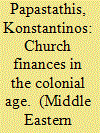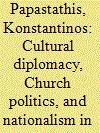| Srl | Item |
| 1 |
ID:
126636


|
|
|
|
|
| Publication |
2013.
|
| Summary/Abstract |
The British Mandatory government established in 1921 a commission in order to control the finances and the vast landed property of the Orthodox Patriarchate of Jerusalem. This paper sketches out the commission's early activity, arguing that its significant powers and its operation at the expense of the clerical apparatus were not so much grounded on the need to facilitate the recovery of the historic church, but were in fact determined by the socio-political developments, at a local and international level, as well as by the necessity to strengthen the British authority in Palestine during a fluid period for public order.
|
|
|
|
|
|
|
|
|
|
|
|
|
|
|
|
| 2 |
ID:
179894


|
|
|
|
|
| Summary/Abstract |
The transition period from the Ottoman withdrawal from Jerusalem to the establishment of British rule was critical for the Orthodox Church. On the one hand, the rule of Patriarch Damianos was contested by a powerful opposition within the Brotherhood of the Holy Sepulchre, which was supported by the government in Athens. On the other hand, the Arab laity sided with Damianos, putting at the same time pressure on the new administration to upgrade its status both at a political and religious level. This paper attempts to contextually sketch out the historical course of events, paying special attention on the religious policy agenda of the new authorities, as well as the diplomatic and cultural factors influencing the decision-making process. Overall, the paper suggests that the internal church crisis under examination was determined by the historical reformulation caused by WWI, the development of Arab nationalism, national ambitions in Athens, and British local and diplomatic policy objectives. Moreover, it argues that this period of crisis should probably be viewed as the starting point of the modern history of the institution (This article extends and updates the analysis of my previous paper, Papastathis 2009 (in Greek). In particular, it employs and contextually analyses new archival sources from the Historic and Diplomatic Archive of the Greek Ministry of Foreign Affairs. The new archival material is related to the intra-religious background and institutional framework, and to the diplomatic and political aspects of the question under examination).
|
|
|
|
|
|
|
|
|
|
|
|
|
|
|
|